Facts about Fiji
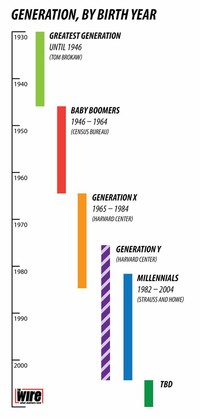
Some mekes are generations old, and form an important part of Fiji's oral history.

On December 5 of that year, Rabuka appointed Ratu Sir Penaia Ganilau as Fiji's first president.

Fiji, endowed with forest, mineral, and fishery resources, has one of the most developed of the Pacific Island economies, despite its large subsistence sector.

The name Fiji is the old Tongan word for the islands, which is in turn derived from the Fijian language name "Viti."

Rotuman language is more closely related to the Polynesian languages than to Fijian.

Fiji, officially the Republic of the Fiji Islands, is an island nation in the South Pacific Ocean, east of Vanuatu, west of Tonga and south of Tuvalu.

Ratu Mara's Fijian Alliance Party won the first post-independence election in 1972.
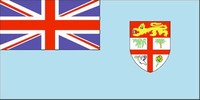
Free and peaceful elections in 1999 resulted in a government led by Mahendra Chaudhry, an Indo-Fijian.

Fiji's sugar export has special access to European Union markets, but will be harmed by the EU's decision to cut sugar subsidies.

Sugar exports, remittances from Fijians working abroad, and a growing tourist industry—with 300,000 to 400,000 tourists annually—are the major sources of foreign exchange.

Among the Indo-Fijian community, there is a small Gujarati-speaking community, and a few older Indo-Fijians still speak Telugu language and Tamil, with smaller numbers of Bihari, Bengali, and others.

Relationships between ethnic Fijians and Indo-Fijians have often been strained.

Fijian Hindustani is derived from one of the eastern forms of Hindustani, called Awadhi.

The political turmoil in Fiji has had a severe impact on the economy, which shrank by 2.8 percent in 2000 and grew by only one percent in 2001.

Overseas remittances from Fijians working in Kuwait and Iraq have increased significantly.

Religion is one of the fault lines between indigenous Fijians and Indo-Fijians, with the former overwhelmingly Christian (99.2 percent at the 1996 census), and the latter mostly Hindu (76.7 percent) or Muslim (15.9 percent).

Modern Fijians play mandolin, guitar, and ukulele along with a variety of indigenous instruments, most commonly lali drums.

Today over 80 percent of the land is held by indigenous Fijians, under the collective ownership of the traditional Fijian clans.

Fiji is organized into four divisions, which are further subdivided into 14 provinces.

The major environmental issues facing Fiji are deforestation and soil erosion.

Until recently, the tallest building in Fiji was the 14-story Reserve Bank of Fiji Building in Suva, which opened in 1984.

The small Arya Samaj sect claims the membership of some 3.7 percent of all Hindus in Fiji.

In 1871, the Kingdom of Fiji was established as a constitutional monarchy, with Cakobau as king, but with real power in the hands of a cabinet and legislature dominated by settlers from Australia.

Citizens of Fiji have the constitutional right to communicate with any government agency in any of the official languages, with an interpreter to be supplied on request.

The remaining 46 are reserved for Fiji's ethnic communities and are elected from communal electoral rolls: 23 Fijians, 19 Indo-Fijians, one Rotuman, and three "general electors" (Europeans, Chinese, and other minorities).
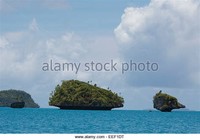
Fiji is a group of volcanic islands in the South Pacific Ocean, lying about 2,765 miles (4,450 km) southwest of Hawaii.

Rotuma, some 310 miles (500 km) north of the archipelago, has a special administrative status in Fiji.

Fiji's membership of the Commonwealth of Nations was suspended due to anti-democratic activities connected with the 2000 coup.

Fijian folk-music styles are unique in their fusion of Polynesian and Melanesian traditions.

Fiji maintains an independent judiciary, with judicial power vested in three courts, the High Court, Court of Appeal, and Supreme Court.

The first inhabitants of Fiji arrived from Southeast Asia.
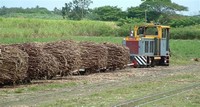
Sugar processing makes up one-third of Fiji's industrial activity but is not efficient.

A year later, this government was deposed in a coup led by George Speight, a hardline Fijian nationalist.

The Fiji national rugby union team competes in international tournaments.

The Spanish flu pandemic of 1918 killed 14 percent of the Fiji population within sixteen days.

Seru Epenisa Cakobau, the Bau Island warlord who united the disparate tribes of Fiji and proclaimed himself king in 1871, renounced cannibalism on his conversion to Christianity in 1854.

From 500 B.C.E., Melanesian seafarers reached Fiji and intermarried with the Polynesian inhabitants, giving rise to the modern Fijian people.

Fijian society is communal, with great importance attached to the family unit, the village, and the vanua (land).

The 577 national assembly deputies (555 for metropolitan France, 15 for overseas departments, and seven for dependencies) are elected by popular vote under a single-member majority system to serve five-year terms.

Fijian belongs to the Austronesian family of languages and is closely related to the Polynesian languages, such as Tongan.
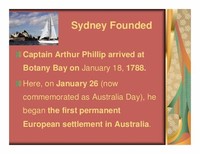
The first permanent European settlement began in 1822, at Levuka, Fiji's first modern town with Christian missionaries from Tahiti arriving in southern Lau.
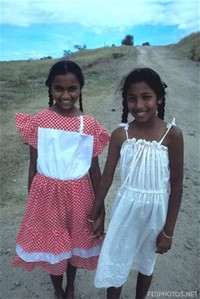
Indo-Fijians produce over 90 percent of the sugar crop but must lease the land they work from its ethnic Fijian owners.

Tovata has been politically dominant since Fiji gained its independence in 1970.










